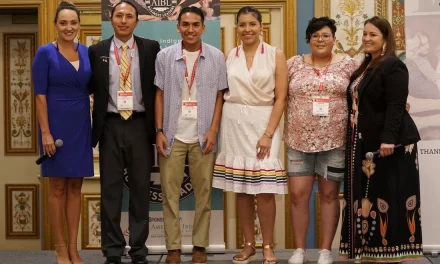On the heels of Congress finally honoring the Little Shell Tribe of Chippewa Indians’ federal recognition in December, the Tribe is celebrating another significant milestone. Today, Little Shell Chairman Gerald Gray will be Montana Sen. Jon Tester’s guest of honor at President Donald Trump’s State of the Union address. Tester helped pass the legislation on behalf of the Tribe.
“I’ve worked with many leaders in the Little Shell Tribe over the past 20 years, and Chairman Gray is right up there at the top,” Tester, D-Mont., said last week in a news release. “He is a relentless advocate for his people who built strong coalitions but wasn’t shy about putting the screws to me and the rest of the delegation when he needed to. Because of his leadership, federal recognition is a battle the next generation won’t have to fight, and I’m honored that he’ll be my guest at this year’s State of the Union address.”
For years, legislation to recognize the Tribe’s federal status were introduced in Congress but never passed as each session ran out. In 2018, the Tribe got 99 of 100 senators to sign it, with Senator Mike Lee of Utah refusing, so the measure failed.
Gray said federal recognition of the roughly 5,300 Little Shell members was really about “dignity” and he was “grateful” to be invited to the State of the Union address. He recognized Sen. Tester as “so instrumental in the restoration of my Tribe’s federal recognition.”
As Tester put it on December 17, “We’re at the finish line: the Little Shell Tribe has fought for more than a century to claim their rightful place as a sovereign nation, and for the last 12 years I’ve been honored to work alongside them to get it done. This is a historic day for the Tribe and for Montana, and now it’s finally time for the President to sign this bill into law and officially recognize the Little Shell Tribe of Chippewa Indians.”
The Tribe currently lays claim to a mere two acres, but the land status must be updated to officially call it Little Shell land. “Eventually we hope to buy thousands of acres,” Gray told The New York Times.
Once the paperwork is finalized, enrolled Tribal members can receive federally funded medical care. Meanwhile the Confederated Salish-Kootenai Tribal College in Pablo, Montana, has announced it will provide Little Shell students the opportunity to attend their school tuition-free.
Future plans for economic development remain in the air. But garnering federal recognition—a victory in what many Tribal members called a “broken system”—opens new doors.








